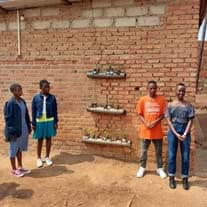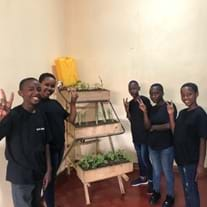Urban Gardens Innovation Challenge in Rwanda, sponsored by Clifford Chance
With the participation of 547 students in 118 teams, the Urban Gardens Innovation Challenge organized in Rwanda by The New York Academy of Sciences in partnership with Association Mwana Ukundwa (AMU) has been a great success.

Sponsored by the Clifford Chance Cornerstone Initiative, the Spring 2022 competition tasked students aged 13-17 from Kigali, the country’s capital, to use micro-gardening techniques to broaden access to nutritious food sources.
Kigali is considered one of the most food-secure cities in Africa, but the ability to obtain nutritious food remains a concern for many poorer households. Malnutrition and micronutrient deficiencies can result in stunted growth and put children and adults’ health at risk.
Eager to address food scarcity and poor nutrition, which affect their communities, the students took up the challenge with great enthusiasm and came up with a wide range of practical and creative solutions to help people living in crowded urban environments supplement their diet with home-grown vegetables.

Challenge participants dedicated many after-school hours to their projects, spending time researching urban gardening methods and suitable crops, brainstorming with their teammates and developing their projects.
Ten public schools and three charter schools, coordinated by AMU, supported the competition and gave students access to computer labs. Several Rwandan science teachers acted as mentors for participating teams.
After carefully reviewing submissions, the judges selected a winning project and five runner-up projects of distinction. Members of the winning team got a chance to showcase their project at the 2022 Global STEM Alliance Summit, organized by The New York Academy of Sciences.
Winning Team: Growing Vegetables
Team members: Tarah (Team Lead), Emerance, Solange, Emmanuel, Sandrine, Hirwa
Mentors: Baseka Didier (in Kigali) and Gaurangkumar Sharma
The team came up with an innovative solution to address food scarcity. To enable low-income households living in cramped conditions to grow vegetables, the team hung recycled PVC pipes and old bottles and used them as planters. Because PVC pipes contain toxic chemicals, the team stressed that they need to be cleaned with ashes before use. After careful research, the team opted to grow produce like onions, garlic and green vegetables, which do not grow long roots and can fit into these containers. The students also developed a simple but effective irrigation system consisting of old jerrycans, a tap and small tubes.
“We did the project after class, so the challenge was going home late and tiredness,” says Team Lead Tarah. But developing this project that can improve the lives of their relatives and the community around them was also a powerful experience for the enterprising students. “I learned a lot from my teammates,” says Emmanuel. “This group is very important to me, it helped me to be happy and work together.”
Runner-up Team: Reducing Lack of Vitamin in Urban Settlements
Team members: Landry (Team Lead), Marthe, Esperance, Sandra, Prince, Christine
Mentor: Rajit Sahu
After brainstorming on the best way to encourage urban dwellers to improve their vitamin intake by growing and consuming more fresh vegetables, members of this team considered three key factors: potential users in urban settlements tend to move frequently; they have little space to cultivate vegetables; and they are short of time. As a result, the team focused on creating a vertical, space-saving micro-garden on wheels. With recycled wooden planks, they fashioned a stair-like structure consisting of terraced planters, irrigated with tubing, which can be used to grow fresh vegetables.
Building their prototype required hard work but the team learned a lot in the course of working on this project and enjoyed the process. “In this project, I had a lot of fun and did hard work with the group, brainstorming and searching for a solution,” says Esperance.
Runner-up Team: Growing Vegetables
Team members: Fabrice (Team Lead), Nziza, Teddy, Ally, Djanati, Samuel
This team also focused on portability and created a vertical garden with wheels to cultivate a variety of crops. As planting containers, they used old jerrycans cut in half while wooden sticks provided legs. They then added wheels for easy transportation. Team members explored the nutritional qualities and health benefits of several types of vegetables and consulted experts, and opted to focus on carrots, cabbage, onions and green peppers.
“I thought our project would help the poor who do not have a large farm, as they cultivate small and fertile land,” says Ally. Team Lead Fabrice concurs and says he, too, has benefited from the project. “This project helped me in different ways: it got me thinking and work hard and helps my parents to have our own food garden with a great expense.”
Runner-up Team: Urban Garden
Team Members: Kamana (Team Lead), Aziz, Kamana, Ivanka
Mentor: Idowu Obisesan
The team conducted a survey in the community and discovered that many people lack knowledge and time to grow vegetables. Team members therefore focused on cultivating fast-growing plants such as lettuce, onions, cabbage that require minimal care. They found that by placing plants in a transparent jar filled with water that is changed every second day, roots would grow within two weeks. By encouraging their community to develop basic gardening skills, the team hope their initiative will have a positive impact on people’s daily lives.
“This project taught me that there are multiple ways to grow plants and that growing plants is actually really interesting if you give it time and attention,” says Ivanka. “It was an enlightening experience,” concurs her teammate Albina. “It has improved my communication ability. I would love to do it again.”
Runner-up Team: Growing Crops at Home by Using Discarded Materials
Team: Cedric (Team Lead), Esther, Jean-Marie, Christian, Kevin, Axelle
Mentor: Rubarema Maurice (in Kigali)
Having identified the high cost of vegetables as a root cause of poor nutrition, the team focused on using widely available discarded materials such as plastic bottles, glass and sacks to build a tiny kitchen garden. Using old timber, they constructed a small frame that they lined with sack fabric and filled with soil and manure. They carefully selected the vegetables they planted after researching the amounts of water and manure required for each crop.
“As team leader, I helped my team to find the land where we built our kitchen garden,“ says Cedric. Says team member Arielle: “I helped my team with the irrigation of our crops. I learned why we have to irrigate our crops and put manure in soil for every crop.”
Runner-up Team: Using Different Local Tools to Increase Crop Production
Team: Elias (Team Lead), Samantha Kiara, Englide, Glory, Uwase
Mentor: Rubarema Maurice (in Kigali)
To optimize the use of space, water and manure, and increase crop production, this team experimented with different seeds that they planted in a variety of recycled containers. For example, they drilled holes in the sides of plastic tubs to plant green onions. They also discovered that they could accelerate germination by poking small holes in nutrient-rich ripe bananas, planting seeds, then covering them up with soil.
“Working in this challenge helped me to think further and brainstorm. I also got new skills in making kitchen gardens, how to create innovation and transform useless tools into useful things,” says Team Lead Elias.
A broad positive impact
In September 2022, Academy and Clifford Chance staff visited Rwanda’s capital Kigali and discussed the Urban Gardens Innovation Challenge in a series of interviews with local stakeholders. They confirmed that the innovation challenge had left a lasting, positive impact at several levels:
- Participating students supplemented their studies about nutrition and urban agriculture by deeply researching the subjects and were then able to apply their extended knowledge to improve soil quality and grow vegetables. In addition to improving their own family’s access to food, the students also gained self-confidence and developed a broad range of skills, including leadership, problem solving, critical thinking, teamwork, computer skills, and design and technology.
- Teachers and participating schools expressed great satisfaction with the challenge. The nineteen local science teachers who mentored and supported students during the competition reported that the challenge had improved their own self-confidence. They expressed pride in the students’ contribution to address malnutrition in Rwanda. The challenge brought a new approach to teaching STEM, making it more relevant and rooted in the students’ living experience.
- Families and the greater community also benefited from the challenge. Students’ parents followed their children’s progress with great excitement and acknowledged that the Urban Gardens Innovation Challenge had improved food stability in their household. They shared their children’s achievements with neighbors and the wider community.
- Policy makers also highlighted the potential for further positive effects, since the Urban Gardens Innovation Challenge reinforced a government policy that encouraged households to grow their own food.
